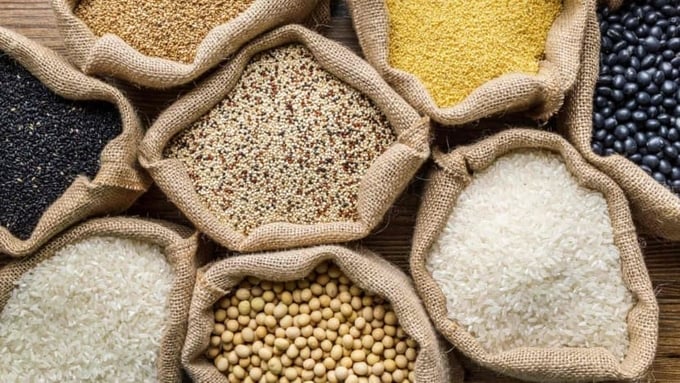November 27, 2025 | 20:29 GMT +7
November 27, 2025 | 20:29 GMT +7
Hotline: 0913.378.918
November 27, 2025 | 20:29 GMT +7
Hotline: 0913.378.918

File photo of a variety of grains and seeds. Photo: iStock/ASMR
Speaking during a joint food resilience event at the COP27 Singapore Pavilion in Egypt, Ms Fu said that countries need a better understanding of climate impacts to pivot towards resilient and sustainable food production.
"As a small island with less than 1 per cent of our land available for food production, our companies in the agri-food ecosystem must grow more with less," she said in her speech.
"We have laid our '30 by 30' goal, to build the capability and capacity to grow 30 per cent of our nutritional needs by 2030. It is an ambitious goal that requires innovation.
"While we are in the nascent stage of developing our agri-tech industry, I am happy to share that we are seeing some promising innovations."
She mentioned Temasek Rice – developed by researchers at Temasek Life Sciences Laboratory – that can withstand extreme climate conditions such as flood and drought, and resist pests.
Singapore is also developing solutions such as an indoor vertical vegetable farming system that uses 90 per cent less water and recirculating aquaculture systems for sea-based fish production, using less energy and upcycling fish waste into valuable products.
It is also investing in research for new technologies, she added.
"In 2019, we started the Singapore Food Story R&D Programme focusing on sustainable urban food production, future foods, and food safety science and innovation," Ms Fu said.
"Last month, we announced that we will invest another tranche, in areas such as improving the nutritional qualities of crop and fish varieties, and developing future foods with better nutrition, taste, and texture. This brings our commitment under the programme to S$300 million."
Novel food is another area that has much potential to supplement food security, she said, adding that it utilises less land and has a smaller carbon footprint compared to conventional animal proteins.
"To enable innovations while regulating the safety of such foods, the Singapore Food Agency has in place the novel food regulatory framework to facilitate companies producing novel food products to conduct safety assessments of their products for review before they are permitted for sale," she said.
In 2020, Singapore became the first regulatory authority to allow cultured meat to be sold. More recently, food products containing the microbial protein Solein were approved for sale, Ms Fu said.
She added that cultured meat products will take time to scale up and commercialise.
CLIMATE SCIENCE RESEARCH
Ms Fu said that climate change will affect food production in Southeast Asia, impacting food security around the world.
"Changes in temperature and atmospheric carbon dioxide can affect crop yields. Climate change will also increase the frequency and intensity of extreme weather events such as droughts and floods," the minister said.
"For example, by the end of the century, rice yields of some countries in Southeast Asia may potentially decline by about 50 per cent, assuming no adaptation or technical improvement."
Singapore set up the Centre for Climate Research Singapore (CCRS) in 2013 to better understand such regional impacts, Ms Fu said.
"The CCRS brings global climate models down to localised models of greater resolution for temperature, rainfall, and wind changes," she added.
"These models allow better assessment of climate change on regional crop and aquaculture yields, inform our understanding of food resilience, and guide us in developing adaptation solutions."
The gathered data will be progressively shared through platforms such as the Coordinated Regional Downscaling Experiment for the Southeast Asia Region and the UN Food and Agriculture Organisation.
This will help countries in the region share information and "equip themselves better in understanding the effects of climate change", she added,
Ms Fu will be in Egypt until Nov 20 to attend the COP27 summit and its associated meetings, the Ministry of Sustainability and the Environment said in a press release on Saturday.
She will deliver Singapore’s national statement, attend high-level events, hold meetings with her counterparts, and participate in events at the Singapore Pavilion. She is accompanied by officials from agencies in the Inter-Ministerial Committee on Climate Change.
(CNA)

(VAN) A new study reveals how the simultaneous effects of ocean acidification, salinity and loss of oxygen are making the world more fragile.

(VAN) Hopes are growing that the creation of the first 3D turkey gut model could be a turning point in the battle against the virulent blackhead disease.

(VAN) Tyson, America’s biggest meat supplier, plans to shutter one of its largest beef processing plants as the industry continues to struggle with low cattle supplies and political pressure from Washington.

(VAN) New FAO study shows how digital solutions are empowering farmers and fishers to prevent losses and build resilient agrifood systems.

(VAN) Brazil's COP30 presidency pushed through a compromise climate deal on Saturday that would boost finance for poor nations coping with global warming but that omitted any mention of the fossil fuels driving it.

(VAN) Poultry farmers in the UK have been warned that they could face one of the worst winters yet for bird flu.

(VAN) Prices of main-crop paddy have risen sharply, with jasmine rice hitting 16,100 baht per tonne — the highest level in years.